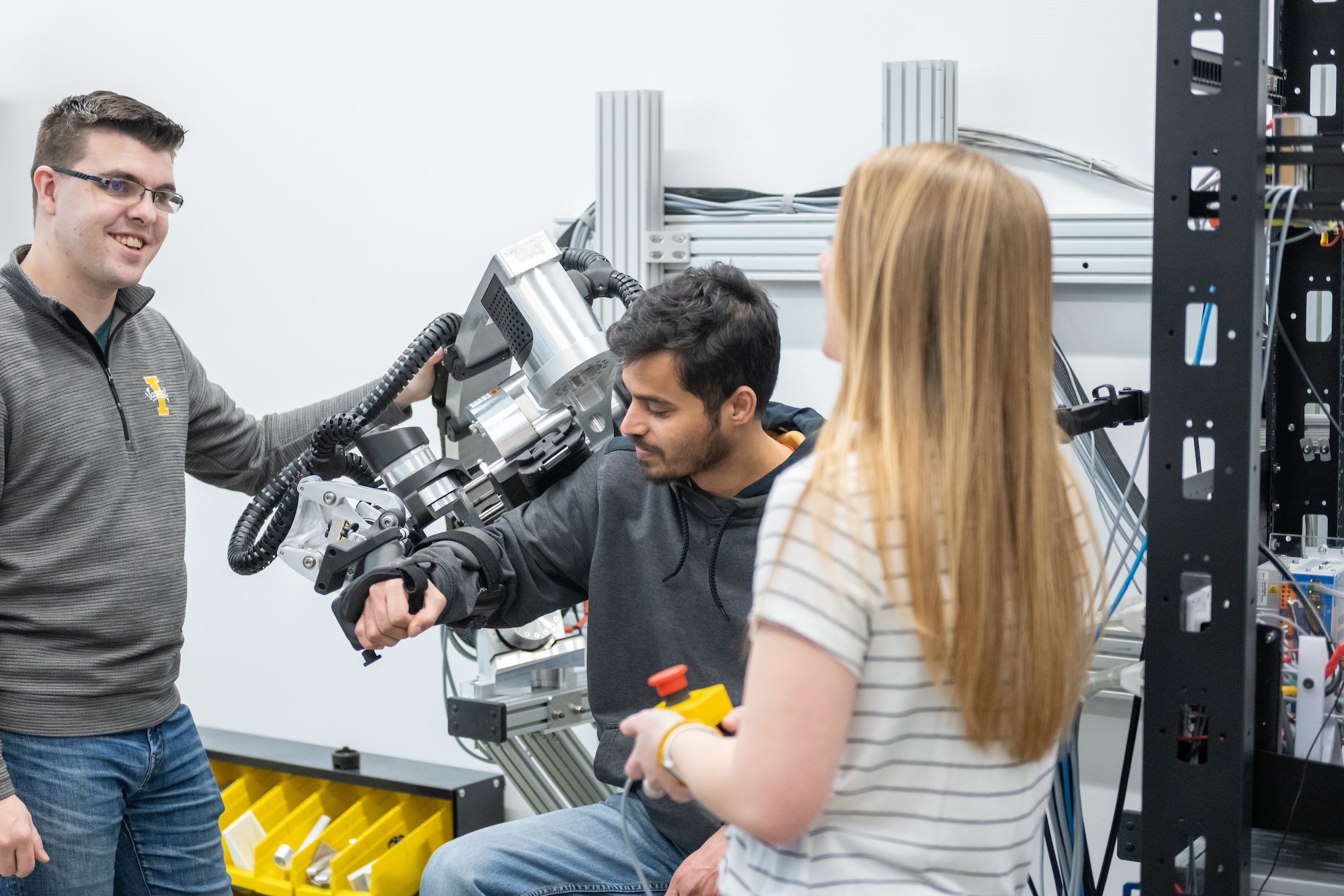At the University of Idaho (U of I), passion sparks real impact. As an institution, the university pioneered a research-driven and innovative approach to delivering lessons in engineering, computer science and cybersecurity. Today, students at U of I are spearheading breakthroughs in their respective fields.
Christopher Bitikofer’s innovation aptly represents the university’s engineering prowess. The mechanical engineering Ph.D. graduate worked with a team of students and faculty members to develop a complex robotics exoskeleton used in therapeutic medicine.
The exoskeleton mimics a human arm’s movement and abilities to help stroke survivors regain mobility. It focuses on two areas of motion — the elbow and forearm. Currently, Providence St. Luke’s Rehabilitation Medical Center in Spokane, Washington, is testing this exoskeleton with its patients.
Bitikofer’s visions came to be at the Assistive Robotics Lab, a state-of-the-art, hands-on learning space where engineering students develop robotic devices that evaluate neurological impairment, gather data to refine therapeutic medicine, and exponentially improve treatment for the greater good.
“Using my engineering degree to make positive change, this is one of the most effective ways for me to spend my time,” said the mechanical engineering PhD graduate. “Working alongside physical therapists and hospital staff and developing these devices, we’re helping people improve their independence.”
Bitikofer’s work proves that opportunities abound for anyone who pursues engineering at U of I, and undergraduates are no exception. At its core, the B.S. Mechanical Engineering teaches students to apply their maths, science, and engineering knowledge to research, design, and test devices or processes.
The program is one of many in the College of Engineering that unlocks exceptional learning, training, and research experiences. For 130 years, the division has provided just that and more through its departments: Chemical and Biological Engineering, Civil and Environmental Engineering, Computer Science, Electrical and Computer Engineering, Mechanical Engineering and Nuclear Engineering & Industrial Management.
With over a century of experience, the college and its departments remain relevant in the modern age by adapting its offerings to tackle new global problems. For example, U of I’s College of Engineering recently launched Idaho’s first undergraduate degree program in cybersecurity.
With the B.S. Cybersecurity, aspiring cybersecurity professionals gain a better understanding of how to deal with cybersecurity threats through simulation. The Real-Time Digital Simulator (RTDS) – connected to a local control hub in the Integrated Research and Innovation Center – can simulate any modern high-voltage power grid configuration. With this, students can mimic control operations and simulate what a cyberattack might look like.

Undergraduate students can pursue Biological Engineering, Civil Engineering, Computer Science, Cybersecurity and more. Source: University of Idaho
Sydney Petrehn, a computer science major, worked as a Premier College Intern for the Air Force Civilian Service alongside senior leaders across the United States and Europe.
“It was awesome,” she enthuses. “The University of Idaho has so many opportunities for students to explore and really immerse themselves in the field. I guarantee you can find something that will help you feel confident and empowered in your ability and understanding of cybersecurity-related topics at U of Idaho. The opportunities are endless.”
The College of Engineering guarantees experiential learning through its interdisciplinary Senior Capstone Design Program nationally recognized by the Academy of Engineering for infusing real-world experiences into engineering education. Students work on creative projects. Industry partners, private industry, or departments at the university sponsor these projects. It culminates with the Engineering Design EXPO, a longest-running student engineering innovation showcase in the Pacific Northwest.
Cooperative Education (co-op) opportunities are available as well for those keen on alternating semesters of academic study with terms of full-time paid employment in positions that boost professional and personal development. In the process, students can earn up to $20,000 US Dollars in the process.
That’s not all. Students can benefit from one-on-one mentorship and personalised learning experiences with a prolific faculty. Picture engaging with University Distinguished Professor Dr. Jim Alves-Foss, who is one of two members leading the cybersecurity program, has published over 125 peer-reviewed conference and journal papers, primarily in the field of cybersecurity.
Likewise, University Distinguished Professor Dr. Brian Johnson is a registered professional engineer in Wisconsin and Idaho. His research interest focuses on power system protection, power quality, superconductivity applications in transmission and distribution, energy storage systems, real-time simulation of traffic systems, and intelligent transportation systems.
It’s clear why U of I is the “No. 1 Best Value Public University in the West”, according to U.S. News and World Report. They are also the only public university in Idaho to be ranked best value by Forbes, Money, and The Princeton Review.
So what are you waiting for? If you are ready to define your future at the College of Engineering, click here to learn more today. Follow the University of Idaho’s College of Engineering on Facebook and Instagram










